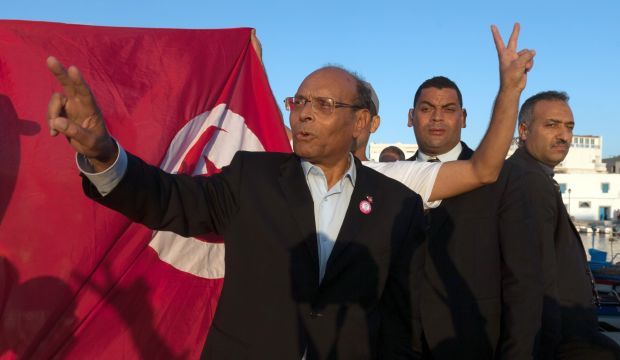
Presidential candidate and Tunisian president, Moncef Marzouki, waves before addressing his supporters during a campaign meeting in Bizerte, northern Tunisia, on November 19, 2014. (AP Photo/Aimen Zine)
Tunis, Asharq Al-Awsat—As Tunisians head for the polls to elect a new president, speculation has arisen regarding the future direction of country’s foreign policy in the event that the incumbent, Moncef Marzouki, is not re-elected.
While Marzouki, a former member of the Congress for the Republic Party, remains one of the favorites to win, he faces stiff competition from a number of other prominent candidates.
First among them is Beji Caid El-Sebsi, former head of parliament under ex-president Zine El-Abidine Ben Ali, who was ousted in 2011 following the widespread protests that kicked off the Arab Spring. Sebsi is also the leader of Nidaa Tounes, the party which beat Ennahda to win a plurality in the Tunisian parliament in October.
Kamel Morjane, former foreign minister and defense minister under Ben Ali, is another of the political heavyweights who should be giving Marzouki a run for his money.
The candidates have their differences, but all are decided on one thing: no-one wants to repeat Marzouki’s foreign policy decisions if elected. The president has faced criticism during his almost three-year tenure for a number of his foreign policy decisions, with many accusing him of damaging Tunisia’s relations with several of its neighbors and prominent allies.
One decision that sparked a tide of criticism was Marzouki’s severing of all diplomatic ties with Damascus in 2012 due to the Syrian regime’s handling of the crisis which erupted following the outbreak of the Arab Spring.
Marzouki has, however, been defiant regarding the decision, saying recently in response to the criticism that “if I were faced with this situation today, I would make the same decision—that is, cutting off ties with Syrian regime for all the massacres it has committed against the opposition and thousands of innocent protesters.”
Sebsi and Morjane, as well as most other candidates in the race, have also been critical of the decision, maintaining that it harmed Tunisian interests in Syria.
Several have accused Marzouki of “conflating his role as an activist with that of his role as a statesman,” in reference, respectively, to his work during his years as an opponent of Ben Ali’s regime, and his role as president since 2011. Most of these candidates have also said they will resume diplomatic ties with Damascus if they win the post.
Marzouki has also faced criticism over the deterioration of the relationship with Cairo, with many criticizing his speeches before the UN and the European Parliament following the ouster of Islamist president Mohamed Mursi on July 3, 2013.
During both speeches, Marzouki laid into the Egyptian interim government led by Abdel-Fattah El-Sisi, who would later become the country’s president, lamenting “the violation of human rights in Egypt after July 3, 2013” and calling for the release of the incarcerated ex-president Mursi.
The fact that Ennahda, an offshoot of Muslim Brotherhood organization, entered government during Marzouki’s time in office also created a frosty atmosphere between Tunis and Cairo, as they did with most of the Gulf countries, many of whom have banned the group over the past year.
Several candidates, including Sebsi, have already made a point of vowing to restore these relations to their former glory, singling out those with Saudi Arabia and the UAE especially.
But perhaps the most critical foreign policy issue during Marzouki’s troubled stint at the Carthage Palace has been Tunisia’s stance to the border dispute between Morocco and Algeria over the Western Sahara region. Some of Marzouki’s comments have been interpreted by Algiers as showing bias toward Rabat, and he drew further anger by inviting King Mohammed VI of Morocco for a 10-day visit to Tunisia in the midst of the dispute in May.
Almost all candidates have made mention of relations with Morocco and Algeria, with some stressing the latter due to the priority of ensuring security in light of the crisis in Libya, which shares its western border with both Tunisia and Algeria.
Independent presidential candidate Hamouda Ben Slama, who also heads a Tunisian–Libyan business group, said during his campaign recently that dealing with the “the Libyan file” was not just an issue in the country’s foreign policy, but also a “national priority.”
Such a priority also extends to augmenting political and economic relations with the neighboring country, Tunisia’s biggest trading partner after France, according to official Tunisian figures.
But should Marzouki win the race, “the Libyan file” will be a priority for him as well. Following the outbreak of Libya’s most recent crisis, with Islamist and other militias battling it out with elements from the country’s army for control of the its biggest cities and ports—and the country’s currently having two parliaments—Marzouki said: “There can be no future for Tunisia without Libya, and no future for Libya without Tunisia,” stressing that one of the priorities of his new term in office would be to help broker an end to the country’s internal dispute.
Whoever wins, and despite some disagreement between candidates, there seems to be consensus on most issues, with even Marzouki toeing the line. Another certainty will of course be the continuation of strong relations with one of Tunisia’s biggest trading partners, the EU; relations that have been ongoing for decades. As a famous saying from one prominent country in that bloc goes: “Plus ça change, plus c’est la même chose.”

Trackbacks/Pingbacks